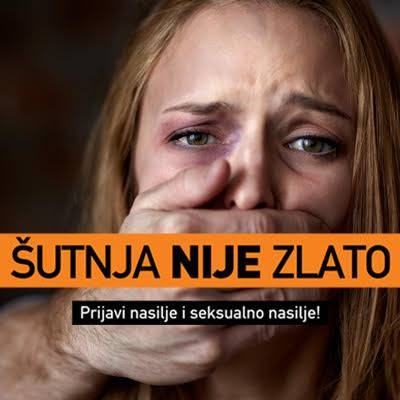
June 2017—In Bosnia and Herzegovina (BiH), violence against women and girls is widespread and underreported—an all-too-common dirty little secret. The issue does not get the attention and time it deserves, and neither do the perpetrators. But a nationwide campaign—that included petitions, billboards and a special postage stamp—recently stirred unprecedented civil society and political will to better prevent and properly punish such acts.
In a 2013 survey of 3,300 BiH families conducted by the BiH Gender Equality Agency, half of all women had experienced some form of gender-based violence during their adult life (15 years and older).
“BiH is still a traditional patriarchal society, and our women and girls are growing up in the 21st century convinced that they need to suffer and remain silent,” said Maja Gasal-Vražalica, member of the BiH Parliament.
With USAID support, the association Women for Women and the WomenNet network brought together more than 100 citizen organizations across the country in a four-month, 10-city campaign, Silence Is NOT Golden. Billboards and posters bearing the slogan (pictured) were put up across the country (in Tuzla, Sarajevo, Banja Luka, Bihac, Bijeljina, Brcko, East Sarajevo, Mostar, Orasje and Zenica).
An online petition drew over 15,000 signatures, a lot for BiH, demanding that both entity governments (the country’s governance is divided between two bodies—the Federation of BiH, which consists of 10 autonomous cantons, or districts, and the Republika Srpska)—and the self-governing Brcko district increase punishment for the perpetrators of this kind of violence. Currently, they mostly get away with a proverbial slap on the wrist.
“Today we are sending a message that silence is not golden and should not be,” said Gasal-Vražalica at the campaign launch on Nov. 26, 2016.
The campaign focused unprecedented public and political attention on the problem of violence against women and children in BiH—and on the need to amend laws to stop and punish it. BiH institutions illuminated their building facades in orange on the first day of the campaign.
In the Federation of BiH, the media, citizens and several authorities publicly supported the campaign, including the vice president; the Women’s Caucus, which was first established with USAID support; the minister for human rights and refugees; the Sarajevo cantonal minister of labor, social affairs, displaced persons and refugees; and the speaker of the Sarajevo Canton Assembly.
Members of the Tuzla canton government signed the petition publicly, joining citizens in demanding that the institutions of both entity governments harmonize laws with the U.N. convention against gender-based violence.
The international community, led by U.S. Ambassador to BiH Maureen Cormack, supported the campaign. “When perpetrators of violence against women and children are not adequately punished, it means that the authorities and the society approve of such acts. Domestic violence is not just a problem in the family; it is a social problem that we all need to address. In BiH this means stronger punishment for the crime committed whilst providing protection to victims,” she said.
Bosnian postal services supported the campaign by creating a special-issue postage stamp and envelopes bearing the campaign poster and slogan. Educational institutions organized lectures for students in high schools and for university faculties of political science, law and criminal justice.
The campaign prompted initiatives to amend the Criminal Code of the two government entities, an effort that is currently underway and which includes the participation of campaign NGOs.
This assistance is part of USAID’s Civil Society Sustainability Project, which is designed to encourage civic activism and increase government accountability in BiH. The project runs from 2013 to 2018.
LINKS







Comment
Make a general inquiry or suggest an improvement.